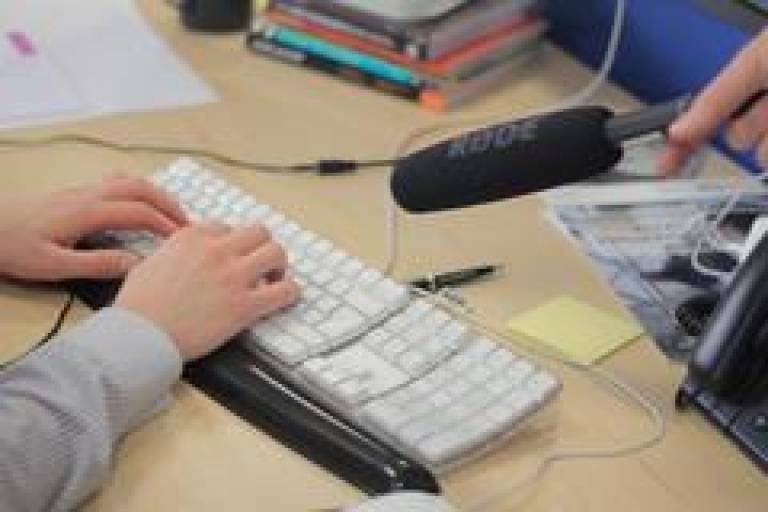Competition: Sounds of UCL
19 February 2013
The deadline for this competition has now passed.
 However, if you would still like to submit sound recordings of UCL for the SoundCloud, please contact Rob Eagle, UCL Communications multimedia producer (r.eagle@ucl.ac.uk).
However, if you would still like to submit sound recordings of UCL for the SoundCloud, please contact Rob Eagle, UCL Communications multimedia producer (r.eagle@ucl.ac.uk).
Use your mobile phone or an audio recorder to capture the sounds of UCL in labs, corridors, study spaces, accommodation and rehearsal rooms, inside and outside. We will add the best recordings to UCL's SoundCloud channel, but there will be special prizes for the top three entries (see rules below).
UCL has over 180,000 followers on SoundCloud, more than any other university in the world. We will cite you as the recordist of the track and publish the tracks under Creative Commons, so that our followers around the world can remix our 'Sounds of UCL'.
We will also be building an interactive map of UCL, where visitors can click on locations and 'hear' those places, modelled loosely on the Guardian's interactive sights and sounds from the Shard project (http://gu.com/p/3d4q6).
Need some examples? We have already put together a playlist of UCL Soundscapes (embedded below), from places including the kitchen of the Print Room Café and a class at Bloomsbury Fitness.
To all researchers, we are particularly interested in recordings of your research environment, be it the interesting sound made by a piece of equipment or the hubbub of a busy cell culture lab on a Friday afternoon. Be daring and experimental (we know it's in your nature)!
Deadline: Friday, 22 March
Competition rules and guidelines
Prizes:
- First - £50 in vouchers
- Second - £30 in vouchers
- Third - £20 in vouchers
How to submit:
- We will accept an audio track in any format. You can use anything to record, like your mobile phone, or you can borrow one of our audio recorders. Try to record in the highest quality possible.
- Title your sound with location and your name. For example: 'Library_reading_room_Jen_Smith.wav'
- You can submit your sound recordings to Rob Eagle (r.eagle@ucl.ac.uk) via the UCL Dropbox
Top tips:
- Get up close and personal. The key to clear audio recording is to place the recorder close to the source of your sound. If you're recording a page turning on a book or a pipette extracting liquid, place the audio recorder as near as possible to the action.
- Recording levels - Be sure you're recording between -12dB and -6dB. If it's too quiet, we might not be able to boost the sound. And if it's too loud, there's no way to salvage the track.
- Use headphones! You should always monitor the sound as you record it. Otherwise, how can you be sure what the recorder is picking up?
- Try to record in Wav, not MP3, if at all possible. MP3 is a compressed format, so we ideally want a higher fidelity format. You may record on any device you like, such as a mobile phone. But to help you record higher quality sound, we can also lend you a Zoom H2N audio recorder and give you some guidance. Contact Rob Eagle in UCL Communications with any queries (r.eagle@ucl.ac.uk).
Rules:
- The competition is open to all UCL staff and students.
- Length: we will accept brief sounds or longer atmospheric recordings up to two or so minutes long.
- The recording must take place in a UCL-affliated location.
- No interviews please. Any voices should be as ambient sounds.
- No rude or obscene sounds or language. (You know what we mean.)
- You will retain copyright of your recording, but in submitting, you allow us to make these recordings public. Additionally, with the recordings published under Creative Commons, you will allow others to download and remix your tracks, provided they cite you as the recordist. We will also use some of these recordings in an interactive UCL map and cite the recordists.
- There's no maximum number of submissions. Send in as many as you like.
- Judges' decision is final.
Judging panel:
- Dr Farlan Veraitch - Senior Lecturer in Biochemical Engineering
- Ian Rawes - British Library Sound Archive and founder of the London Sound Survey
- Rob Eagle - UCL Communications multimedia producer
 Close
Close

